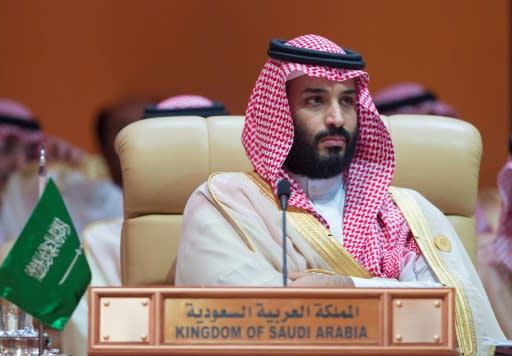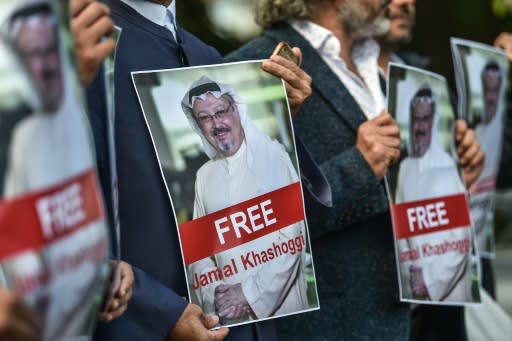Saudi prince's image seen at risk over missing critic
The disappearance of a prominent critic of Saudi Arabia's rulers after entering the kingdom's Istanbul consulate risks severely tarnishing the reformist image of its de facto leader Crown Prince Mohammed bin Salman, experts say. Riyadh has denied allegations made by Turkish officials that Saudi columnist Jamal Khashoggi was murdered inside the kingdom's mission by a team sent specially to Istanbul. Analysts said that while the claim of a state-sponsored killing of the Washington Post contributor was unconfirmed, it would seriously damage the prince's credentials as a reformer if true. "It would be a major blow to the image that Saudi Arabia's advocates have so carefully tried to cultivate in the west, particularly in Washington," Kristian Ulrichsen, a fellow at Rice University's Baker Institute in the United States, told AFP. Britain said on Sunday it was "working urgently" to verify the "extremely serious" allegations surrounding Khashoggi, who has been critical of some of Prince Mohammed's policies and of Riyadh's intervention in the Yemen war. The 33-year-old crown prince, who was named heir to the throne in June 2017, has garnered international attention with his rapid rise to power as well as social and economic reforms. While he has been lauded by some for pursuing changes such as lifting a decades-long ban on women driving, others have criticised his recent crackdown on political dissent. The kingdom has detained a number of human rights and women campaigners this year, some of them accused of undermining national security, with scant public information about their whereabouts or the legal status of their cases. Prince Mohammed -- commonly known as MBS -- was also the subject of criticism in November 2017 when he was accused of placing Lebanese Prime Minister Saad Hariri under house arrest in Riyadh. The same month dozens of Saudi officials were arrested in what the authorities said was an anti-corruption crackdown. - 'Reckless gambits' - Khashoggi's alleged murder -- if confirmed -- threatens to undermine Riyadh's already strained relations with Ankara, and the fallout could also reach the United States, a key ally, experts said. "It would likely trigger a diplomatic crisis with Turkey as well as play into a narrative in (Washington) DC that views Saudi Arabia under MBS as prone to seemingly reckless gambits with little apparent thought for the consequences, be it the blockade of Qatar, the detention of Saad Hariri, the rupture with Canada, to say nothing of the war in Yemen." Bessma Momani, a professor at Canada's University of Waterloo, agreed that Prince Mohammed's reputation was at stake. "If Khashoggi's death is confirmed and accusations against the Saudis hold, the image of the 'reformer' crown prince becomes more difficult to swallow particularly in Washington and other Western capitals,"she told AFP. James Dorsey, an expert in international affairs, said that the critic's disappearance could lead to a "significant deterioration" in relations between Ankara and Riyadh. "Turkey and Saudi Arabia differ on a host of issues, whether it's Iran, Qatar, the Muslim Brotherhood. There are more disagreements than agreements," Dorsey, a fellow at Singapore's S. Rajaratnam School of International Studies, told AFP. "If (the Turkish authorities) are able to prove that Khashoggi was killed in the consulate or by Saudi agents, that's going to have far-reaching consequences." - 'Affront to sovereignty' - Riyadh and Ankara stand on opposite sides of the dispute between Qatar and its neighbours. Saudi Arabia, the UAE, Bahrain and Egypt cut ties with Doha in June 2017 over allegations it supports extremists and is cosying up to arch-rival Iran and Islamist group the Muslim Brotherhood. Ulrichsen said that it would "likely trigger a diplomatic crisis" between Ankara and Riyadh if the Saudis are linked to Khashoggi's death. Momani also believes the relationship will likely "worsen". "Turkey will claim this was an affront to their sovereignty and Saudi Arabia will point to the Turkish-Qatari alliance as an explanation for Turkey's accusations," she said. But Ali Shihabi, director of the Washington-based Arabia Foundation, a pro-Saudi think-tank, urged the public not to jump to conclusions. "Before everybody jumps to conclusions, why would a government conduct a 'premeditated assassination' of a dissident in its own consulate as opposed to anywhere else where they would have plausible deniability," he tweeted on Saturday. "Again the Turks are not a neutral party. For sure the whole story has big holes in it but lets think before we jump to conclusions." Saudi Crown Prince Mohammed bin Salman has garnered international attention with his reforms and rapid rise to power Missing Saudi columnist Jamal Khashoggi has been critical of Riyadh's intervention in the Yemen war



